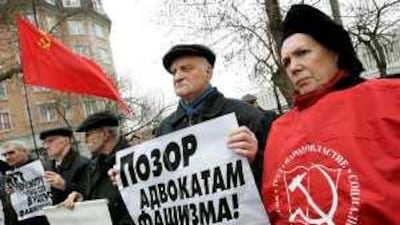BERLIN // Poland has banned communist symbols under a controversial new law that effectively equates communism with Nazism and reflects the country's continuing struggle to come to terms with its past suffering.
The law signed by the president, Lech Kaczynski, last month states that people who possess, purchase or distribute items or recordings containing communist symbols can be fined or imprisoned for up to two years. It is already causing confusion, with left-wing critics saying it technically outlaws wearing a T-shirt emblazoned with a red star or the image of Che Guevara. Even the Heineken beer logo with its trademark red star could fall under the ban if it were applied strictly, critics say.
The legislation was initiated by Law and Justice, a right-wing opposition party that Mr Kaczynski helped found. It was also supported by the governing party, Civic Platform. A Law and Justice senator, Zbigniew Romaszewski, said in an interview that the law was needed to help the process of "decommunisation", which had not yet been completed in the 20 years since Poland ditched communist rule. The sight of the red star of communism was as offensive as the Nazi swastika, Mr Romaszewski said. "I cannot see any difference between the Soviets' mass murder of millions on the grounds of social status or a desire for freedom, and the Nazis' mass murder due to ethnic origin."
Poland suffered greatly at the hands of both the Nazis and Stalin's communists. Memories of the country's most tragic chapter were revived in September when it held sombre ceremonies to mark the 70th anniversary of the 1939 invasion by Nazi Germany and the Soviet Union. Six million Poles were killed in the Second World War - half of them Jews murdered in extermination camps the Nazis built in Poland. The Nazis and Soviets had secretly agreed to carve up the country, and went on to perpetrate massacres to wipe out Poland's intellectual and military elites.
After the war, Poland lived under communist rule until 1989, when it became the first Eastern Bloc country to hold free elections after a decade-long campaign led by the Solidarity trade union. "Between 1939 and 1945 Poland was under two cruel and violent occupations: by Nazi Germans and communist Soviets. The Polish attitude to them was clear: they did not differ much from each other," said Mr Romaszewski, 69, a human rights campaigner who was jailed by the communist authorities for two years in the 1980s.
He added that young Poles were not sufficiently aware of their history. "We need to remember that deep knowledge of the past is indispensable to form a prosperous future. Unfortunately, schools are supposed to teach about the modern world and are disregarding a historical education," he said. Under the new law, the use of communist symbols for artistic or educational purposes is exempt from prosecution. Critics say the main problem of the law is that it does not define what symbols are banned.
"It will be up to the courts to decide what is outlawed. It's crazy because in theory the ban could apply to Che Guevara T-shirts or even to Heineken beer with the red star," Tadeusz Iwinski, a member of parliament for the opposition left-wing Democratic Left Alliance, said. "Without the definition, the ban could even apply to Warsaw's tallest building, the Palace of Culture and Science. That was built by Stalin. Or imagine Polish leaders heading for Beijing and having their photo taken in front of Communist Party symbols there. Would they be punished, too? Of course I'm making fun, but there you can see the stupidity."
Mr Iwinski said his party was preparing a motion to have the law overturned by Poland's constitutional court. He said the law had not been the result of any serious debate but had simply been added as one of a number of amendments to the penal code. Opponents of the law say it is likely to be overturned at the European level anyway. Hungary, which banned such symbols of communism as the hammer and sickle and red star as "symbols of tyranny" in 1994, was admonished by the European Court of Human Rights last year.
In 2003, a Hungarian politician, Attila Vajnai, was arrested and fined for wearing a red star on his lapel during a demonstration. He appealed his sentence all the way to the European Court of Human Rights, which decided that the ban was a violation of the freedom of expression. "History should be left to the historians," Mr Iwinski said. "The problem we have had in recent years in Poland is that we are too concerned with history and don't focus enough on current challenges such as the economy. Taking a historical approach only divides people instead of uniting them."
@Email:foreign.desk@thenational.ae

